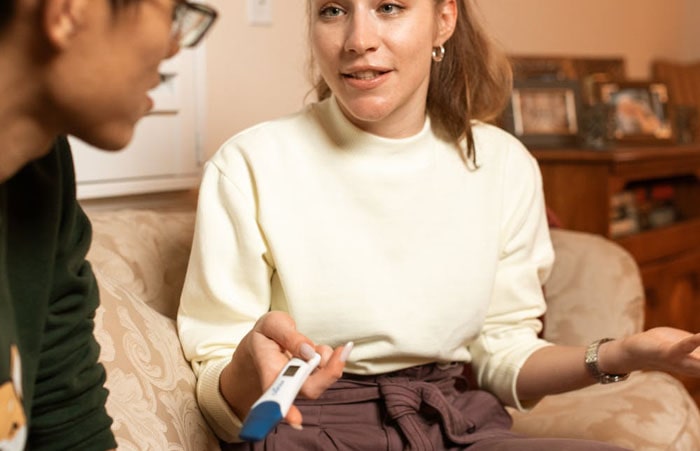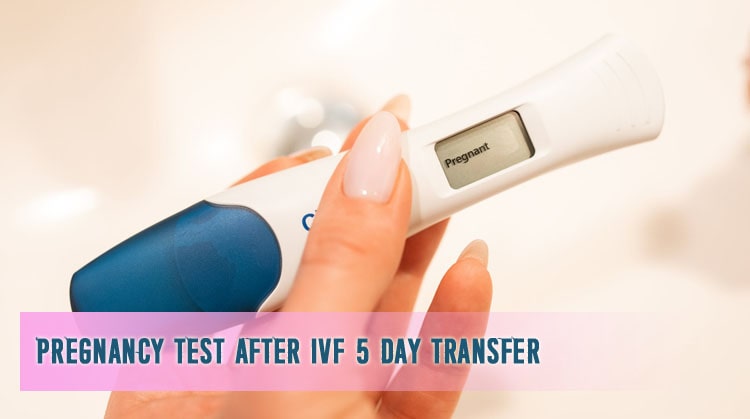Giving birth to a child is essential for perhaps the most important desire. But the road to achieving it is not always easy. Pregnancy is a dream for some couples. It requires a lot of effort to get.
Unfortunately, infertility still deprives many families today of the self-evident joy of having a child.
Most infertile couples manage to realize their dreams. Eventually, a baby is born with the help of in vitro fertilization (IVF).
However, despite advanced techniques and methods, several IVF methods, unfortunately, do not give the desired results.
However, in the case where it seems that something starts but suddenly stops. Anxiety and grief are more intense.
A few days after the onset of pregnancy, you will see that it is finally a chemical pregnancy. However, let us explain the situation in more detail. In this article, you will know better about pregnancy test after IVF 5 day transfer.

Pregnancy test after IVF 5 day transfer
How soon can I take a pregnancy test after a five day IVF transfer?
The way to avoid false-negative results is to take a pregnancy test on the day of their expected time. Also, if it comes back negative, then repeat the second test a few days later.
The date given by the doctor to women who have IVF depends on the cycle-protocol.
However, of course, the results of a blood test are valid. Usually, the pharmacist’s pregnancy test is the first step to see if the result is positive. Then confirm it with a blood test. It is also known to people as B-chorionic.
If a woman has a negative result in the initial test, her blood test will need to be re-tested. Because if there is any sexual intercourse, that raises the suspicion of pregnancy.
If she is pregnant, her body’s hCG will double every day. Also, soon the test is positive.
If the test you are doing does not yield a positive result, your period delay must continue. You will need to see a gynecologist to investigate the causes.
How many days after embryo transfer can I take a pregnancy test?
Transfer of fertilized egg cells to the test tube, embryo transfer is a common procedure. But for most couples who want to have children, holding the womb is a very special moment. However, where pregnancy can begin.
However, when is a fetal transfer possible? After fertilization, the early human embryos are initially divided about once a day. On the second day of culture, there is a four-cell.
The 3rd is in an eight-cell glass dish 24 hours after fertilization and two days after fertilization. Collect the maximum possible transfer of one, two, or maximum of three fertilized egg cells to the uterine cavity.
Usually, on the third day, the fetus’s genetic makeup becomes active on the fetal genome. From the fourth day of culture, development is somewhat rapid and also very different for individual embryos.
Typically, the morula stage (mulberry germ) reaches the fourth day. Blastocysts (vesicular germs) are also noticeable on the fifth or sixth day. Then, of course, the transfer of the embryo takes the last place.
Usually, some centers prefer to perform the transfer of blastocytes. It has the potential to grow well in any egg cells. It also makes it easier to see which ones are more likely to be planted. Also, the uterus’ lining needs to be particularly acceptable after five days (like applying natural fertilizers).
Usually, most centers do not mind if a partner is present during the embryo transfer. This procedure takes a few minutes. Embryos are just visible to the human eye and located at tiny points of the solution.
The fluid is usually introduced into the uterine cavity using a thin tube. However, like germs, it is almost completely painless. You then lie quietly for about half an hour. Then you can go home.
How soon can you take a pregnancy test after the frozen embryo transfer?
You will usually take a pregnancy test two weeks after the transfer of the fetus. The exact date is then usually found in the final report.
The most common cause of unsuccessful infertility treatment is the failure of the fecal transplant. This is commonly called medical implantation failure. Artificial insemination does not lead to the desired success.
It depends on the quality of the embryo and the implantation capacity of the lining of the uterus. Sometimes the reason for the lack of planting is understandable. For example, if the embryos are of low quality.
The question remains, what exactly is the reason? Although despite the transfer of very good quality embryos, pregnancy does not occur. However, several factors can play a role in implant failure.
Can I take a home pregnancy test after IVF?
An IVF or IVF procedure proves that medical science can work wonders. The process begins with hormone therapy. It increases the growth of many eggs in a woman’s ovaries.
These eggs then use sperm selected from the partner’s specially processed sperm. Then also collected and fertilized on test plates. Grow fertilized eggs for 2-5 days. Then turns into embryos.
The healthiest of these fetuses is in the uterus and where these can grow the most. Also, sometimes implanted in his body. After which, the pregnancy begins. However, positive β-chorionic gonadotropin is a fact.
Changes in the fetus and uterus during this time determine the success or failure of pregnancy.
There is a one percent risk that the test result will be wrong even after using it properly. The pregnancy test may be negative. But you are still pregnant and vice versa.
Most of the time, the test is wrong. Therefore, pay close attention to the instructions contained in the package. Then really check with morning urine.
Home urine tests with pharmacy pregnancy tests are less sensitive than blood tests. It does not occur until hormone levels increase as the pregnancy progresses.
It is best to wait 14 days after ovulation for the exact results of a pregnancy test from a pharmacy. If the urine pregnancy test is too early, it cannot detect HCG, which can also be mistakenly negative.
What happens after you get a positive pregnancy test after IVF?
Sensitive pregnancy occurs very early from the blood sample 12 days after the transfer of the fetus. Its results are almost available. However, you need to know two hours after the blood reaches the laboratory.
If it is positive (more than 20 µU / ml beta-HCG), continue the medication after consulting your doctor. Even if bleeding occurs, it can occur during a normal pregnancy.
Urine pregnancy tests that you can buy in stores and carry on yourself at home. It is not final and confusing with the IVF method. It cannot support externally supplied pregnancy hormones.
Also, no one can differentiate between a sick pregnancy.
Conclusion
You can discontinue a dose of> 10 mg (2 tablets) daily if your pregnancy test is repeatedly negative. Also, stop all medications immediately except immunosuppressants.
Discuss the gradual withdrawal process with the doctor who prescribed the immunosuppressant for you. Hopefully, you have a complete idea about the pregnancy test after the 5 day transfer of IVF.
We talk about more Pregnancy
Apple Juice Pregnancy Test, Accu Clear Pregnancy Test, Urgent Care Pregnancy Test, Pregnancy After Tummy Tuck, Tdap Vaccine Pregnancy Pros and Cons, Presumptive Signs Of Pregnancy

